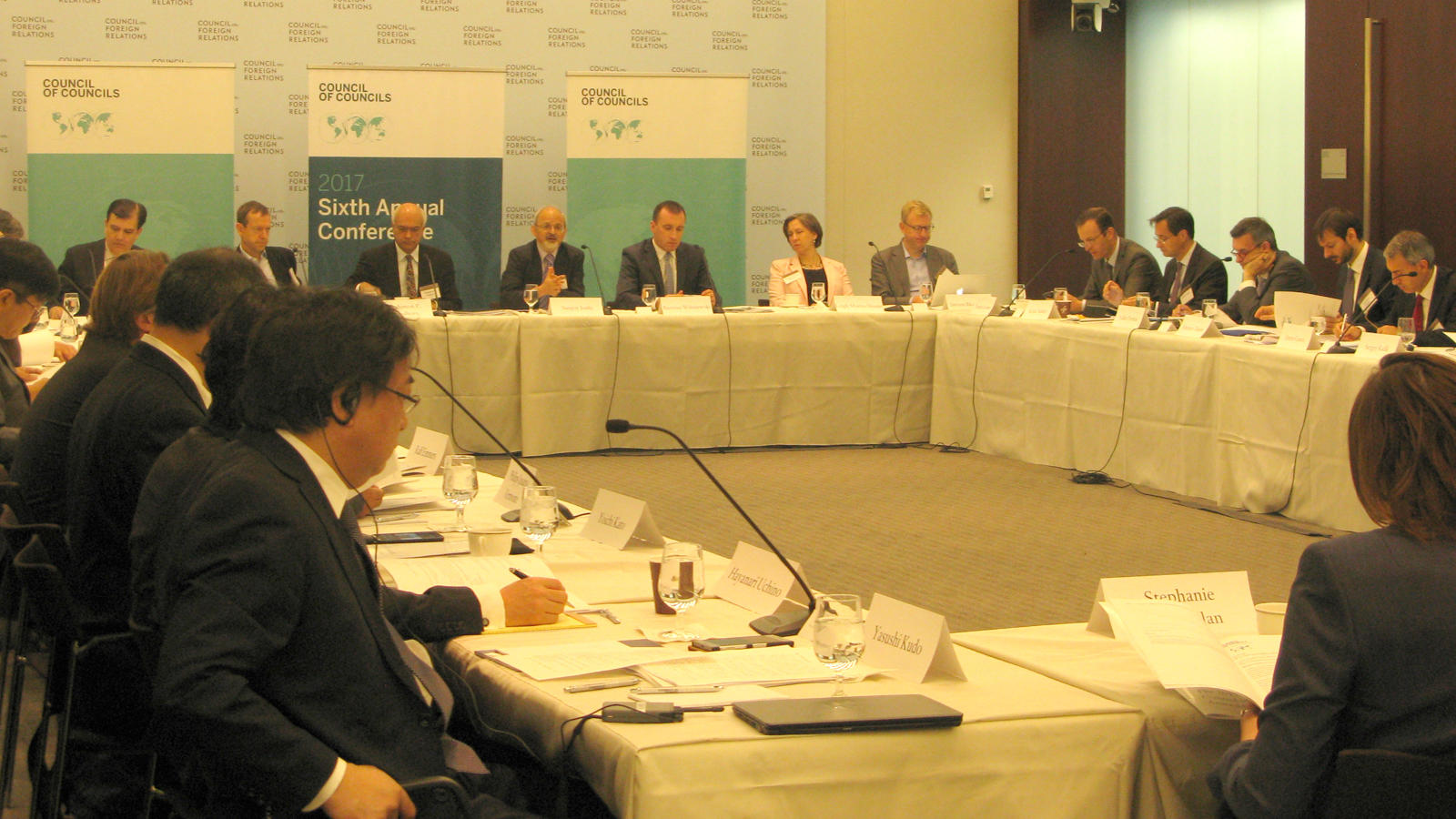
On May 9th, 2017, just before G7 Summit so called Taormina Summit, the 6th annual meeting of Council of Councils (CoC) which 25 world leading thinktanks' leaders gathered was held in Washington, D.C. and presented Report Card on International Cooperation in 2017 which graded on advancing international cooperation.
The Genron NPO President Yasushi Kudo joined this event as the representative of Japan.
CoC is the global network initiated by a Council of Foreign Relations (CFR) in U.S. and comprising 26 major international policy institutions in order to tackle current global issues by connecting those member thinktanks across the world, which hold influential power over foreign policy and a process of forming public opinion in each country.
This annual assessment is counted for the 3rd time this year after each leader of member thinktanks answered the survey individually in January to evaluate on 10 global issues that the world is facing, their answers were collected for an overall grade.
Uncertainty in the world is increasing as challenging global issues such as BREXIT, "America First" policy advocated by Trump administration, the long standing civil war in Syria which is deemed to have no solutions and the nuclear weapon development issue of North Korea are intensified more than ever. Therefore the presentation of Report Card was awaited to better acknowledge the global efforts for those issues.
The overall grade of International Cooperation in 2017 lowered sharply.
The highlighting comment of the Report Card this year is "In 2016, the world witnessed some of the most significant shocks to multilateralism in twenty-five years, and the future of the rules-based global order was called into question" then the Report Card downgraded its overall assessment to a C- form B in previous year, which is barely above a D.
Compared to the result from the previous year 2015 of the total of 7 assessments of grade A and B, 10 of each "2016 grades on global issues", there was no grade A assessments and only 4 grade B assessments which can be concluded as a quite harsh result or limited improvement in International Cooperation. Especially for the categories of "Expanding Global Trade" and "Preventing and Responding to violent Conflict Between States", a very low grade of D+ was given. Although for "Mitigating and Adapting to Climate Change" was downgraded to a B falling from a A in last year, it is continuously assessed as one of the best categories as it was explained the Paris Agreement on climate change was ratified within a year from its adaptation, almost the record time for a multilateral agreement.
Corresponding to CoC survey results, thinktank leaders choose 3 priorities for global leaders to address. One of 3 priorities is "Combating Transnational Terrorism." "With a rising number of terrorist incidents in 2016, there has been a stronger consensus across countries about the need to strengthen cooperation in combating transnational terrorism," commented Abdulaziz Sager, chairman of the Gulf Research Center in Saudi Arabia and continued "What remain missing is a broader commitment on dealing with the root cause of terrorism." Also, "Preventing and Responding to Violent Conflict Between States" was addressed as the lowest priority issue in 2017. "Expanding Global Trade" was "dealt a severe blow with the demise of U.S.-led multilateral trade agreements" and put a low priority as well for policymakers.
Although above 3 problems are assessed as relatively low priorities in 2016, yet they show a strong perception for present and pressed crisis of global thinktank top leaders.
The Genron NPO President, Yasushi Kudo, the only the participant from Japan, said "Coordination between inside border and outside border which interpreted as globalization and free trade is no longer functioning well enough to be advanced further and politicians leveraging populism to manipulate public are emerging across
the world; this is what we perceive as pressed danger. Apparently within this context, democracy is continuously undermined."
He then continued, "Moreover, President Trump is skeptical of global order and now the world is facing the next phase. After the World War Ⅱ, based on peace and multilateralism, the global order which has been cultivated could be destabilized even further. I consider this quite serious danger as it is reflected in the result of Report Card. When the world is facing the phase like now, we should re-examine and question ourselves meanings of global cooperation based on multilateral talks, freedom and rule of law as global cooperation on any diverse issues is increasingly its significance. Above all, I truly hope that our country Japan will play an important role, facilitating world cooperation for better global order."

Post a comment